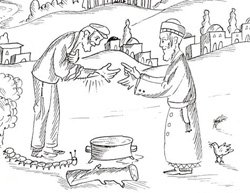|
The Torah portion Metzora begins by stating: "This shall be the law of the metzora: he shall be brought to the kohen, the priest."[1] The verse then goes on to say,[2] "The kohen shall go out of the camp" and inspect the metzora. 
Since the metzora could not possibly come to the kohen, (for until he was declared free of tzora'as he was prohibited from entering the Jewish encampment), what are we to make of the verse "he shall be brought to the kohen"?
Additionally, why does the Torah use the expression "he shall be brought to the kohen," rather than "he shall come to the kohen"? The former phrase seems to imply that the metzora a) is brought forcibly, or b) that his appearance before the kohen is inevitable.
The leprous-like affliction of tzora'as was a punishment for speaking Lashon Hora, slanderous and evil gossip. As part of the punishment, the metzora was to "sit alone; outside the camp."[3]
The Gemara[4] explains that since the metzora's gossip caused a separation between one person and another, he is punished by being separated from others.
In a more spiritual sense, to cause separation and strife is to oppose holiness, one characteristic of which is unity. This was why the metzora was banished from even the lowest of Jewish encampments, for his actions were thoroughly unholy.
However, even a person who committed such a dastardly act will eventually atone,[5] for "G-d devises means so that even he who is banished shall not be outcast forever."[6]
The opening verse of our Torah portion thus assures us that even an individual afflicted with tzora'as will eventually "be brought to the kohen " - he will repent and return to holiness.
And this is so even if the person has absolutely no desire to repent, for G-d desires his repentance. Therefore, willingly or unwillingly, he will surely "be brought to the kohen."
G-d, however, doesn't want anyone's repentance to be forced upon him from Above; every sinner should desire to repent. This is why, after the verse says "he shall be brought to the kohen," it goes on to add that "the kohen shall go out of the camp":
The first step in achieving repentance for one who has no desire to repent comes about because of a desire from Above. As such, it does not permeate the sinner.
The verse indicates this first step by saying: "he shall be brought to the kohen," meaning that the person is transported from his own status and is forcibly brought to a situation that he would not have chosen on his own - repentance is foisted upon him from Above.
Thereafter comes the second stage, wherein "the kohen shall go out of the camp." This means to say that the urge to repentance must be framed in the mindset in which the metzora finds himself, so that repentance is done willingly.
Moreover, when the purification of the metzora, i.e., the act of repentance, comes about in the same place in which the metzora finds himself - outside the pale of holiness - then the sinner's very iniquities are transformed into merits.
This causes a person to rise to such an exalted level that he can attain a degree of holiness which is impossible for those righteous individuals who have never been banished "outside the camp."[7]
Based on Likkutei Sichos Volume VII, pp. 100-103.
Notes:
1. Vayikra 14:2.
2. Ibid. verse 3.
3. Ibid. 13:46.
4. Erachin 16b.
5. See Hilchos Talmud Torah, l'Rabbeinu HaZakein, 4:3; conclusion of ch. 39 of Tanya.
6. II Shmuel 14:14.
7. See Rambam, Hilchos Teshuvah 7:4.
|
